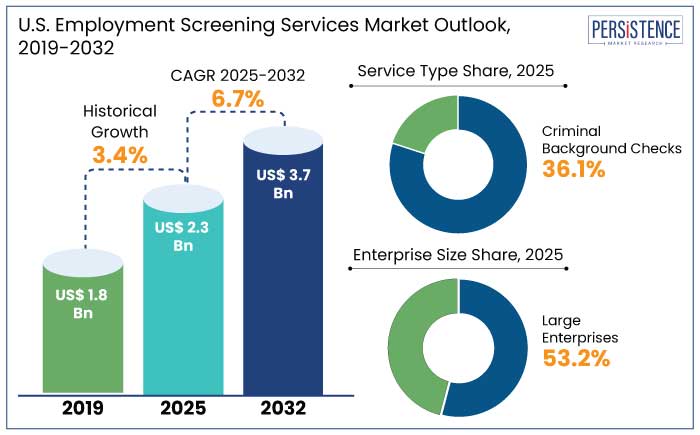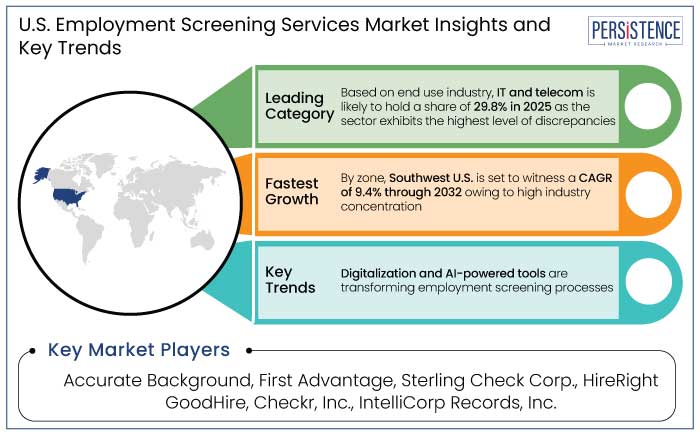Industry: IT and Telecommunication
Published Date: January-2025
Format: PPT*, PDF, EXCEL
Delivery Timelines: Contact Sales
Number of Pages: 184
Report ID: PMRREP35080
The U.S. employment screening services market is estimated to reach a value of US$ 2.3 Bn in 2025. The industry is anticipated to surge at a CAGR of 6.7% during the forecast period to attain a size of US$ 3.7 Bn by 2032.
Organizations in the country are prioritizing a safe working environment, driving demand for thorough background checks to screen out candidates with criminal records or other potential risks. In 2023, about 78% of employers in the U.S. considered criminal background checks essential for hiring decisions.
Federal and state laws, like the Fair Credit Reporting Act (FCRA), require employers to conduct compliant background checks. This fuels the demand for employment screening services. For instance, the healthcare sector mandates comprehensive employee screening under HIPAA compliance requirements.

Key Highlights of the Market
|
Market Attributes |
Key Insights |
|
U.S. Employment Screening Services Market Size (2025E) |
US$ 2.3 Bn |
|
Projected Market Value (2032F) |
US$ 3.7 Bn |
|
U.S. Market Growth Rate (CAGR 2025 to 2032) |
6.7% |
|
Historical Market Growth Rate (CAGR 2019 to 2023) |
3.4% |
Criminal background checks are anticipated to hold a share of 36.1% in 2025. Criminal background checks assist employers to identify potential risks by revealing past offenses, like violent crimes or fraud that could compromise workplace safety or business integrity. For instance,
Criminal checks enhance the quality of hires by decreasing turnover risks. Employers are more likely to retain candidates whose backgrounds align with company values and legal standards. For instance, hiring in roles that involve handling sensitive information or financial assets often necessitates verifying a clean criminal history.
Large enterprises are anticipated to hold a share of 53.2% in 2025. These enterprises frequently manage high-volume recruitment processes, necessitating scalable and efficient screening solutions. For instance,
Industries like healthcare, finance, and transportation, dominated by large enterprises, face stringent regulatory requirements, like HIPAA, FCRA, DOT, making thorough screening mandatory. Over 70% of large enterprises in regulated industries conduct detailed employment screenings to ensure compliance. With larger workforces, the potential risks from negligent hiring practices are higher.
Large enterprises invest in screening services to protect their reputation, avoid legal liabilities, and ensure workplace safety. Negligent hiring lawsuits in the U.S. cost organizations an average of US$ 1 Mn per case, driving large enterprises to prioritize screening services.
IT and telecom segment is anticipated to account for a share of 29.8% in 2025. This segment exhibits a particularly high level of resume discrepancies and skill-specific requirements, necessitating comprehensive screening processes. The rapid adoption of technologies like AI, ML, and big data analytics is increasing the demand for specialized IT roles.
Companies in this sector prioritize thorough background checks, including criminal record screening and drug testing. This ensures employees can handle sensitive data and maintain compliance with regulatory standards.
Increasing reliance on remote work and cloud-based services in the IT and telecom industry has heightened security concerns. Employers seek to mitigate risks associated with remote access to proprietary systems and customer data by investing in robust screening solutions. For instance, the expansion of managed IT services and hybrid cloud solutions underscores the need for reliable and vetted professionals who can secure digital infrastructures.
Employment screening services in the U.S. are integral to modern recruitment and workforce management. The market has witnessed steady growth owing to the increased employer awareness of the risks associated with negligent hiring and the need to build a trustworthy workforce.
The integration of novel technologies like AI and ML is transforming the employment screening landscape. Automated systems enable faster and accurate background checks by analyzing vast amounts of data with minimal human intervention.
Blockchain is also gaining traction for secure and tamper-proof credential verification. These innovations enhance efficiency and decrease turnaround times, assisting organizations to streamline their hiring processes.
Employers are now focused on ensuring that their screening processes adhere to legal requirements with the rise in state-specific laws around background checks, drug testing, and even salary history inquiries. This trend has been accelerated by the ban-the-box movement, which aims to decrease discrimination against individuals with criminal records.
Companies are leveraging screening services that offer automated updates to stay aligned with these evolving legal frameworks. This ensures they are compliant across different jurisdictions.

The U.S. employment screening services market growth was steady at a CAGR of 3.4% during the historical period. The impact of the COVID-19 pandemic brought a surge in remote work, contributing to the growth of employment screening services.
Employers during the period were focused on verifying the qualifications and backgrounds of potential remote employees. The pandemic led to a shift in workforce dynamics, with gig economy workers and freelancers becoming prevalent. This required more personalized and adaptable screening solutions.
The forecast period is anticipated to experience a steady uptick, fueled by stringent regulatory compliance requirements and an elevated focus on workplace safety and security. As companies expand their operations across different states, they are predicted to require comprehensive screening solutions to manage legal risks, decrease employee turnover, and ensure compliance with varying local laws.
Increasing Mobility of Global Talent and International Hiring
Surge in remote work and cross-border hiring has broadened the talent pool for U.S.-based companies. With global workers applying for roles, organizations must ensure compliance with local and international regulations while verifying the credentials, experience, and background of candidates. This is necessary to maintain workplace integrity and mitigate risks. For instance,
The mobility demands rigorous screening processes to ensure compliance with immigration laws and to validate qualifications obtained abroad. The Department of Labor’s Employment and Training Administration has highlighted the increasing importance of verifying foreign certifications as part of the hiring process.
Boom of Gig Economy to Augment Demand Worldwide
Businesses increasingly seek to mitigate risks by verifying credentials, assessing criminal histories, and ensuring the trustworthiness of this growing segment. Gig platforms like Uber and TaskRabbit exemplify this trend. They leverage screening services to confirm worker qualifications and enhance safety measures.
According to the U.S. Census Bureau, non-employer businesses operated by sole proprietors and gig workers are witnessing substantial growth, particularly in sectors driven by on-demand or temporary labor. Employment screening has become critical for businesses relying on contingent workers, especially since these workers often bypass traditional HR onboarding. For instance,
Legal Risks and Liability May Hamper Adoption
The Fair Credit Reporting Act (FCRA) governs background checks, requiring employers to disclose their intent to conduct a screening and secure the prospective employee's written authorization. Employers must also notify candidates of adverse decisions based on screening results, enabling them to contest inaccuracies. Failing to meet these obligations results in substantial penalties and litigation, as demonstrated by several class-action lawsuits in recent years against prominent corporations.
State-specific laws, such as ‘ban-the-box’ policies, add to the complexity. These regulations restrict employers from inquiring about criminal histories early in the hiring process to decrease discrimination against ex-offenders. Employers must navigate these laws carefully while maintaining compliance with federal standards.
In a high-profile case, the state of Texas challenged the Equal Employment Opportunity Commission (EEOC) over guidance on hiring policies for individuals with criminal records. This illustrates the legal ambiguity and liabilities that can arise in this area.
Diversity-centric Employment Screening to Create Novel Avenues
Organizations are increasingly seeking solutions that integrate diversity and inclusivity principles in their hiring processes to ensure compliance with equal opportunity laws and to attract diverse talent. This creates demand for novel screening tools that promote equitable hiring by eliminating unconscious bias, such as name-based discrimination.
By offering anonymized resume screening and AI-driven solutions, employment screening providers can position themselves as essential partners in fostering inclusive workplaces. Federal initiatives like the Executive Orders on Diversity, Equity, Inclusion, and Accessibility (DEIA) are amplifying the need for innovative screening services. These orders mandate improved data collection on workforce demographics and engagement with underserved communities in recruitment.
The trend underscores the demand for screening tools that effectively manage diverse applicant pools while generating insightful demographic reports. This further enables organizations to meet compliance requirements and diversity goals.
Integration with HR Platforms to Open the Door to Success
Rising adoption of cloud-based HR software solutions is creating a high demand for automated employment screening services among companies in the U.S. They are demanding novel services that seamlessly integrate with their existing HR platforms. This integration presents a significant opportunity for employment screening providers to offer services that assist organizations in decreasing administrative burdens, improve accuracy, and enhance the candidate’s experience.
By aligning screening processes with leading HR platforms like ADP, Workday, and BambooHR, companies can streamline their recruitment workflows, conduct real-time background checks, and make data-driven hiring decisions all within a single system. Surging demand for comprehensive employment screening services is driven by rising concerns over workplace safety, regulatory compliance, and the need for reliable candidate evaluations.
As businesses strive to ensure that their hires are trustworthy, reliable, and a good fit for company culture, employment screening services are becoming an essential part of the recruitment process. The seamless integration with HR platforms also ensures compliance with key regulations such as the Fair Credit Reporting Act (FCRA) and Equal Employment Opportunity Commission (EEOC) guidelines, creating a secure and efficient hiring process.
Leading companies in the U.S. employment screening services industry are heavily investing in developing innovative software platforms that streamline the background check process. By incorporating AI, machine learning, and data analytics, these companies offer faster, accurate, and efficient services.
The technological edge assists in improving customer satisfaction by decreasing turnaround times and minimizing errors. This is particularly critical in high stakes hiring decisions. Companies are providing scalable solutions that cater to the specific needs of different-sized businesses, from start-ups to large corporations.
High flexibility in service offerings assists companies to capture a wide range of clients. This includes small businesses requiring simple checks to large enterprises needing complex and multi-layered assessments for executive roles or high-security positions.
Recent Developments in the U.S. Employment Screening Services Market
|
Attributes |
Details |
|
Forecast Period |
2025 to 2032 |
|
Historical Data Available for |
2019 to 2023 |
|
Market Analysis |
US$ Billion for Value |
|
Key Zone’s Covered |
|
|
Key Market Segments Covered |
|
|
Key Companies Profiled |
|
|
Report Coverage |
|
|
Customization & Pricing |
Available upon request |
By Service Type
By Enterprise Size
By End Use Industry
By Zone
To know more about delivery timeline for this report Contact Sales

The U.S. employment screening services industry is estimated to reach a value of US$ 3.7 Bn by 2032.
Increased workforce mobility, remote work, and rising number of start-ups and SMEs are set to drive growth.
Accurate Background, First Advantage, Sterling Check Corp., HireRight, GoodHire, Checkr, Inc., and IntelliCorp Records, Inc. are few of the leading players.
The market is projected to record a CAGR of 6.7% through 2032.
A key opportunity lies in the integration of new technology and automation.